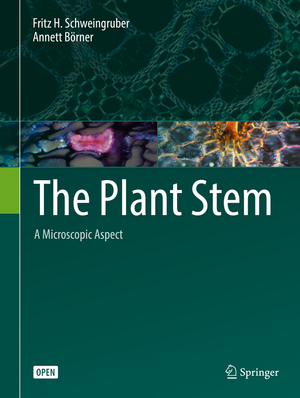The Plant Stem: A Microscopic Aspect
Autor Fritz H. Schweingruber, Annett Börneren Limba Engleză Hardback – 9 iul 2018
The amount of text is reduced to a minimum, and the scientific information is highlighted with short legends and labeled photographs, allowing readers to focus on the pictures to easily understand how the anatomical structures relate to genetic, ecological, decomposition and technical influences. It includes a chapter devoted to simple anatomical preparation techniques, and further chapters showing the cell content, cell walls, meristematic tissues and stem structures of all major taxonomic units and morphological growth forms in various ecological and climatic regions from subarctic to equatorial latitudes, as well as structures of fossil, subfossil and technically altered wood.
This textbook appeals to students and researchers in the fields of plant anatomy, taxonomy, ecology, dendrochronology, history, plant pathology, and evolutionary biology as well as to technologists.
Preț: 384.45 lei
Nou
Puncte Express: 577
Preț estimativ în valută:
73.57€ • 75.89$ • 61.39£
73.57€ • 75.89$ • 61.39£
Carte tipărită la comandă
Livrare economică 22-28 martie
Preluare comenzi: 021 569.72.76
Specificații
ISBN-13: 9783319735238
ISBN-10: 3319735233
Pagini: 204
Ilustrații: VII, 207 p.
Dimensiuni: 210 x 279 x 17 mm
Greutate: 0.73 kg
Ediția:1st ed. 2018
Editura: Springer International Publishing
Colecția Springer
Locul publicării:Cham, Switzerland
ISBN-10: 3319735233
Pagini: 204
Ilustrații: VII, 207 p.
Dimensiuni: 210 x 279 x 17 mm
Greutate: 0.73 kg
Ediția:1st ed. 2018
Editura: Springer International Publishing
Colecția Springer
Locul publicării:Cham, Switzerland
Cuprins
Introduction.- Preparation techniques - Making anatomical structures visible.- Morphology of the plant body.- Cellular composition of the plant bodies.- Structure of cell walls and cell contents.- Primary, secondary and tertiary meristem.- Stem anatomical structures of major taxonomic units.- Evolution of stems.- Anatomical adaptions to permanent changed environmental conditions.- Anatomical adaptions to temporarily changed environmental conditions.- Coexistence of algae, fungi and vascular plants.- Wood decay.- Fossilization, permineralization, coalification, carbonization and wetwood conservation.- Technically altered wood products.
Notă biografică
Fritz Hans Schweingruber
After studies at the University of Bern, Switzerland and postdocs by Hal Fritts in Tucson, Arizona he was teaching during 26 years wood anatomy and dendrochronology at the University of Basel. At the same time he was leader of the Research Group Tree Rings and Environment at the Swiss Federal Institute of Forest, Snow and Landscape in Birmensdorf, Switzerland where he constructed the Northern hemispheric dendroclimatological densitometric network and wood anatomical books from Europe, Russia and the Sahara. 1986 he founded the International dendroecological field week and 2001 the International dendroanatomical weeks.Annett Börner
She is a geo-ecologist with a special interest plant ecology. She has worked for more than 15 years as an editor and designer in the field of scientific publications, in print and web media. She specialises in science communication, and her clients include a number of major research institutes in Europe and Australia. She lives in Adelaide, Australia.
After studies at the University of Bern, Switzerland and postdocs by Hal Fritts in Tucson, Arizona he was teaching during 26 years wood anatomy and dendrochronology at the University of Basel. At the same time he was leader of the Research Group Tree Rings and Environment at the Swiss Federal Institute of Forest, Snow and Landscape in Birmensdorf, Switzerland where he constructed the Northern hemispheric dendroclimatological densitometric network and wood anatomical books from Europe, Russia and the Sahara. 1986 he founded the International dendroecological field week and 2001 the International dendroanatomical weeks.Annett Börner
She is a geo-ecologist with a special interest plant ecology. She has worked for more than 15 years as an editor and designer in the field of scientific publications, in print and web media. She specialises in science communication, and her clients include a number of major research institutes in Europe and Australia. She lives in Adelaide, Australia.
Textul de pe ultima copertă
This unique and attractive open access textbook combines the beauty of macroscopic pictures of plant stems with the corresponding colorfully stained images of anatomical micro-structures. In contrast to most botanical textbooks, it presents all the stem characteristics as photographs and shows the microscopic reality.
The amount of text is reduced to a minimum, and the scientific information is highlighted with short legends and labeled photographs, allowing readers to focus on the pictures to easily understand how the anatomical structures relate to genetic, ecological, decomposition and technical influences. It includes a chapter devoted to simple anatomical preparation techniques, and further chapters showing the cell content, cell walls, meristematic tissues and stem structures of all major taxonomic units and morphological growth forms in various ecological and climatic regions from subarctic to equatorial latitudes, as well as structures of fossil, subfossiland technically altered wood.This textbook appeals to students and researchers in the fields of plant anatomy, taxonomy, ecology, dendrochronology, history, plant pathology, and evolutionary biology as well as to technologists.
Caracteristici
Published with open access Includes more than 1400 attractive color images Offers a perfect combination of the anatomy of plants, their function and the beauty of natural forms All included microscopic slides are new
